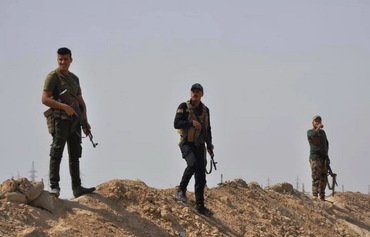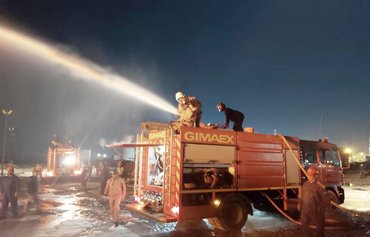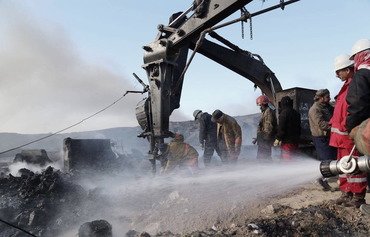Iraq's oil police, who are charged with protecting the country's oilfields, have taken strict measures to prevent "Islamic State of Iraq and Syria" (ISIS) remnants from threatening national energy resources, the police's media director told Diyaruna Monday (July 30th).
Six ISIS suicide bombers on July 19th attacked an oil plant in the northern Salaheddine town of al-Siniya, blowing themselves up among Iraqi oil police forces, according to a source in Salaheddine's police command.
Several members of the Iraqi forces were injured in the attack.
On July 11th, Iraqi forces foiled an ISIS attack on oil wells in western Kirkuk province's Dabs town.
Dozens of the group's elements raided a number of oil well guard posts, and clashed with the stationed police officers, prompting the Kirkuk police to dispatch additional forces to the area.
Drones monitor militant movements
Iraqi oil police forces are prepared to repel any terror attack on the northern oil facilities, Iraq's oil police media department director Capt. Ali al-Maliki told Diyaruna.
"We currently have sufficient forces to protect these facilities after they have been reinforced by security guards from the Southern Oil Police Directorate and troops from Basra," he said.
"Our forces are heavily deployed around oil fields and power plants in Salaheddine and Kirkuk, as well as the al-Qayyarah and Najma oilfields near the city of Mosul," he added.
"We also are co-ordinating with Federal Police and Joint Operations forces to enforce further protective measures," said al-Maliki, noting that "reconnaissance and surveillance drones are monitoring terrorists’ movements on a quasi-daily basis".
Security units are positioned in a series of highlands and remote areas and conduct continuous searches for enemy strongholds, destroying them on the spot, he added.
'Desperate attempt'
ISIS's recent attacks were aimed at damaging Iraq's oil sector infrastructure, and consequently, its economy, said al-Maliki.
It is a "desperate attempt to stop reconstruction in its tracks, as technical and engineering personnel are making great efforts to repair oil production plants and refineries", he said.
These facilities have suffered severe destruction at the militants’ hands, particularly in the city of Baiji, northern Salaheddine, he added.
"Thirty out of 87 oil wells in the Salaheddine fields, most notably the Allas and Ajil oilfields, stopped production after they were destroyed by ISIS elements during their control of the province," said al-Maliki.
The group's elements also set fire to many oil wells in al-Qayyarah, which the Oil Police, in co-operation with Iraq's Civil Defence Corps, were later able to extinguish.
ISIS remnants seek to show that their group is still able to pose a threat through attacks waged by smaller pockets of extremists, al-Maliki said, "but they are indeed finished and a thing of the past".

![Iraqi engineering teams repair oil wells in the al-Qayyarah oil field after they were damaged at the hands of the 'Islamic State of Iraq and Syria'. [Photo courtesy of the Northern Oil Company]](/cnmi_di/images/2018/07/30/13754-Iraq-Qayyara-oil-600_384.jpg)






